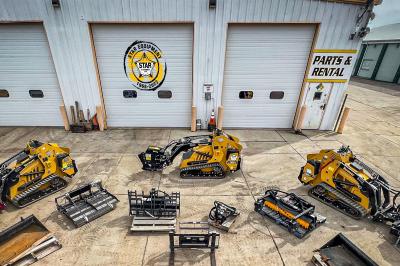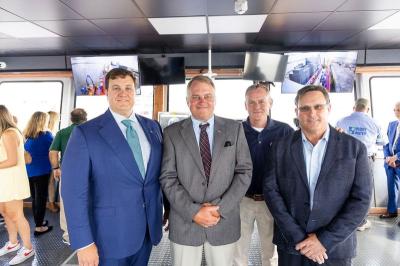If it’s not unique among Associated General Contractors (AGC) members, Power Line Constructors (PLC) is certainly among a scarce few women-owned companies that is being passed on to a second generation.
In Delores Y. Critelli’s case, the second generation consists of her sons, David, president and CEO, and Steven, vice president, corporate secretary and general counsel.
It’s safe to say that when she and partner Elmer Wahl opened the firm in April 1963, Delores did not expect to create a legacy. In an interview a few years ago, she said, “I always intended just to make a decent living but I’ve wound up loving this business.”
According to her son, Steven, Delores is very good at hiring people who share her passion for the business. He said when he joined the business in 1997, “I was proud of the way the business worked — the kind of philosophy she instilled here.”
That philosophy seems to be, “Do what it takes to get the job done on time and correctly.”
The firm was not Delores’ idea; exactly. Some 40-plus years ago, she had taken a temporary job at a construction company, which turned into a permanent job before the firm dissolved. Wahl was one of the partners of the old firm and he asked Delores to join him in a new venture constructing and maintaining high-voltage electrical systems for public and private contracts. She agreed on one condition: that she be a partner, not an employee. They both invested a modest amount of capital, bought two trucks, hired two employees and went to work as Power Line Constructors, doing work for Niagara Mohawk out of a small garage on Main Street in Utica.
The first years were “touch and go,” but work steadily increased and by 1973 the firm did $4 million worth of work and was expanding into a new line: traffic signal and intersection construction.
In 1972, Power Line moved to new headquarters, a 20,000-sq.-ft. building on 6 acres in Clinton.
Traffic signal work and highway lighting is now the mainstay of the firm, especially with the new Intelligent Transportation Systems (ITS) that are being installed around the state.
“We thrive on ITS and traffic jobs,” said Steven, “although we will do pretty much any type of outside electrical work.”
Power Line also has adapted to the changes in technology. It added traffic signal integration, video cameras, microwave detection, and infrared security to it repertoire. The company also engages in other types of electrical construction projects, such as airport lighting, weight in motion, weather stations, prison security systems, and high mast lighting towers.
“We will continue to do any kind of traffic intersection and highway lighting jobs,” added Steven, “although the market is particularly competitive because there are always newcomers with aggressive prices entering the field. Therefore, we have to expand the palette of services we offer.”
Power Line works as both a prime and subcontractor on New York State Department of Transportation (NYSDOT) jobs as well as jobs for other agencies and private companies, especially utilities. For the current construction season, Power Line has prime contracts for work in the cities of Syracuse and Fulton, Onondaga County and NYSDOT Regions 3 and 9.
In the past year, the company also performed lane modification lighting at the 50 interchanges for the NYS Thruway, proof that PLC is not only a Central New York contractor. Its prime and subcontract work is listed at the company’s Web site.
The company believes its primary success in working with other contractors is its ability to coordinate schedules so each contractor can perform its work without causing a delay to another, while at the same time protecting workers on the job site and the traveling public at large.
As with all firms that make it for the long haul, there were a few jobs that pushed Power Line to new heights. One of those was a $32-million project for the New York State Power Authority in the 1970s, a joint venture with Lord Electric and BEC Electric, that called for installing 81 mi. of high-voltage transmission line from Massena to Marcy. The 765-kilovolt line, completed in 1978, is the most powerful in the state, according to the Power Authority and Power Line was instrumental in its construction.
During that time, Wahl retired, leaving Delores in charge of the business.
“I was scared and very apprehensive about running the business myself,” she said of the time. “This is a man’s business. To be running it on my own as a woman, well, it was scary. I was afraid the bank wouldn’t have confidence in me.
“My decision was just to work harder.”
Along the way, Power Line acquired a reputation for doing high-quality work while meeting time schedules for all its customers, from private entities and small villages up through the agencies to the federal government. Delores wasn’t afraid to take on emergency work, with the critical, time-sensitive work that entails.
Son David began working for the firm as a laborer in 1970. He worked his way up to foreman, then superintendent. Since 1980, he has been the firm’s chief estimator and supervisor of all design, engineering and estimating operations. His growing control of the business, coupled with his brother Steven’s participation since 1997, have allowed Delores to cut back on the time she spends running the business, although, like many contractors, she’ll never completely retire.
“I might work less, but I love this business too much to give it up.”
This from a woman who spent seven years taking night classes at Syracuse University so she could get her college degree, a dream she had deferred earlier in life because her only brother was killed in a construction accident when she was in high school and Delores felt she could not leave the grandparents who had raised heer since age four.
“I put my dreams on the back burner but I never lost my desire to someday run a business” — a dream that seems to have begun when she ran a lemonade stand outside her grandmother’s grocery store.
“My grandparents were tremendous role models and taught me the importance of hard work,” she said. It obviously paid off. Delores has been showered with awards for her company’s work. Power Line has been named one of the top women-owned small businesses in the nation by Dun & Bradstreet’s ratings in Entrepreneur magazine and Delores received a 1997 Business Owners Achievement Award from the Professional Women in Construction, among other honors.
Steven, an attorney who had worked in the New York City and Long Island areas, credits his mother with not only the longevity of the business but also the longevity of its key staff.
“We’ve had very little turnover of supervisory personnel in the last 10 years. The reason why people stay here is because of her — she set a good example and she has been very, very good to a lot of people.”
That stability among key personnel, as was the firm’s history of using innovative business practices, has been of great help to the Critellis as they launched a new firm, PLC Trenching Co. (PLCT), in 1998.
In a short time PLC Trenching has been successful in breaking into the telecommunication and the wind energy markets, in part because it could draw on the experience of Power Line Constructors for creating innovative solutions to problems.
“We try to make sure the customer gets the best value for the dollar while making an honest profit,” said Steven. “PLCT is very much in line with the Power Line business philosophy — if we can think of ways to do our job faster, better and also be more profitable, we will do it.”
To that end, when the principals made a significant investment in trenching equipment and started PLCT, it didn’t stop there. Instead, PLCT modified the equipment and now operates specially fitted wheel trenchers with proprietary laying box technology. It’s not unusual, Steven said, for PLCT to spend three or four months building the equipment necessary to “accomplish the job the way we see it being done.”
The laying box technology allows the company to lay utilities to more than a 6-ft. depth, in soft soil or hard rock; place communications, electric, gas, water, sewer, underdrain, cable or combinations in any desired configuration or position with or without backfill.
As the only company in the United States currently using this particular technology, PLCT has been able to market its services nationwide. In the past six years, PLCT has worked in 10 states, including wind energy projects in West Virginia and Wyoming, and telecommunications projects in Massachusetts, New York and Maryland. PLCT has worked for Kiewit Construction Corp., Gilbert-Southern Corp., Mastec Inc., and MFS Technologies, among other, and is currently working on a 60-mi. telecom installation for the Colorado Department of Transportation.
Steven credits his brother, David, with the technical expertise and business acumen needed to lead both companies into the next decade. David has had to assume the difficult task of studying and passing state licensing exams to ensure the firm is a licensed contractor in approximately a dozen states.
“To qualify to operate on a nationwide basis is quite an accomplishment for a company of our size.”
Steven said PLCT has made great strides in gaining acceptance by the people who are significant players in telecom and wind energy industries.
“The companies we work for are concerned with the quality of the installation,” said Steven, which is where PLCT has an edge, because Power Line’s business philosophy has always included that component.
Steven said that, although Power Line works mostly above ground, it was not such a huge leap to move into trenching and underground utility installations, since Power Line’s work touched on these.
“Many of the facilities for traffic signals and highway lighting are now underground, and the technical background we acquired to make Power Line successful was very useful for starting PLCT’s business.
“We did have to learn the [underground utility] business to some degree but we invested in equipment that made the work easier and we modified it to suit our business methodology. We already had the technical and business knowledge necessary to estimate and address the work.”
Nevertheless, there still was the uncharted territory of getting private work in a national forum.
“There was a considerable learning curve in becoming acclimated to negotiation-oriented bidding rather than the traditional competitive bidding that typifies the public work that Power Line engages in.”
The two firms have a good synergy.
“We’ve been able to rely on the strengths of Power Line to forge our way with PLCT,” said Steven. However, Power Line still remains a strong player in the New York State outdoor electrical industry. “We have a very good relationship with the New York State Department of Transportation. When we do projects for the NYSDOT, they know that we do quality work.”
Additionally, Power Line would like to see more jobs like its “interconnect project” for the city of Syracuse in the mid-1990s, where it rebuilt and linked more than 140 intersections so that a central traffic control center can monitor the activity at all simultaneously and change the timing of the traffic control signals dependent on traffic conditions.
IN 2003, Power Line completed another ITS project on the Albany-Schenectady Route 5 corridor.
“We’ve been very lucky,” concluded Steven. “We’ve had very faithful and accomplished employees and there have always been individuals who want to rise to the challenge. We look forward to continued success.”
(This article appears courtesy of “Low Bidder” magazine.)
Today's top stories















